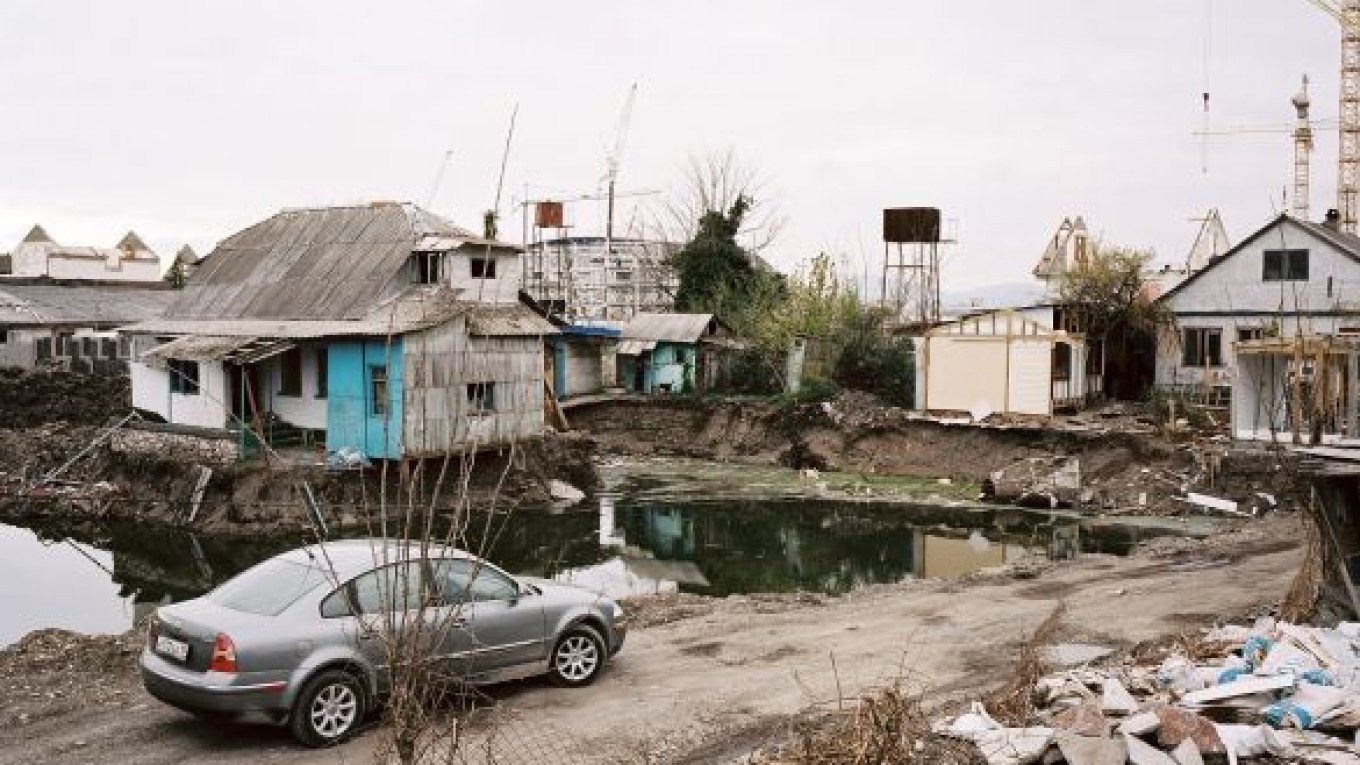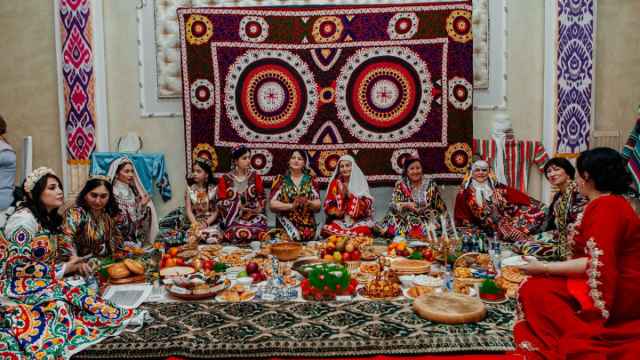The government's preparations for the 2014 Winter Olympics in Sochi, granted to the southern Russian resort town in 2007, have been visible for years. However, an exhibition of the photos from the Sochi Project, a multimedia report that has chronicled the North Caucasus region since 2009, had to be rushed together in a matter of days after photographer Rob Hornstra and writer Arnold Van Bruggen were denied visas to re-enter Russia and the original venue canceled the show.
Originally scheduled to open at the Winzavod Center for Contemporary Art last Friday as part of the Netherlands-Russia Year of Cultural Exchange, plans for the event began to unravel as news that the journalists' visa applications were denied became known in late September, and Winzavod scrapped the event shortly after. The FotoDoc Center for Documentary Photography at the Sakharov Center jumped in to fill the void, hosting a small number of the photos at the same time as a parallel event was being held in Amsterdam.
The project itself gives an in-depth portrait of Sochi and its surrounding area, though the vast majority of the photos deal with the recent conflicts in the region, both in the North Caucasus and Abkhazia, which is less than 40 kilometers from the Olympic sites. Their work has been in-depth and covered human rights abuses happening in Sochi's backyard both in the preparation for the Games and during previous decades.
Artistically, the project, now available on the website thesochiproject.org in an eight-chapter story with photos and video, mixes the political with the personal, including photos of the preparations for the Games, the individuals living in the poverty of surrounding areas, wounds suffered from years of wars and landscapes of the beautiful countryside where those conflicts took place.
The show at Winzavod was originally set to show scores of photos from the Dutch duo's multi-year adventure, however the show was cancelled by the trendy art center two weeks ago after Van Bruggen and Hornstra were denied visas by the Federal Migration Service. Lenta.ru at the time reported that Winzavod canceled the show because one of the photographers did not sign the contract and did provide the necessities for carrying out the exhibition. Indeed the visa denial and quick visa switch surprised friends of Hornstra, who had already booked their flights to Moscow and came to the impromptu show in place of the photographer.
The Dutch guests were able to speak with their friends via a Skype chat linking the two rooms. Van Bruggen and Hornstra addressed the gathered crowd briefly and stated their hope that journalistic work in the North Caucasus would continue.
Hornstra explained to The Moscow Times that the original show, which was being planned for a year and a half, included the large photos on display at FotoDoc in addition to smaller prints that would be done in the Netherlands. The short time frame between agreeing with FotoDoc and the opening of the exhibition on Friday limited the photo selection to the large prints.
The show without a home will now go on to its first major exhibition this upcoming Friday and will receive many homes when it opens in Antwerp, Belgium. It will then go on to the U.S., Britain, Austria and Canada next year.
Hornstra said he is open to showing the full project in Russian galleries, including in Sochi, but also says working with Winzavod again is "not very likely." He added that "their generous offer to organize a new date is not very realistic and I guess they know that as well," because the estimated one million rubles needed to put on the exhibit was coming largely through government funds as part of the Netherlands-Russia year, celebrating 400 years of relations between the countries.
The Netherlands-Russia year, which is drawing to a close, is increasingly being mentioned less for international brotherhood and more for the ironic contrast with the rising tensions between the two countries. News of Hornstra and Van Bruggen's visa denials came after the Dutch government proposed legal action against the Russian arrest of activists on an Amsterdam-registered Greenpeace ship when they were protesting at a Gazprom Arctic drilling platform and a series of incidents have seen diplomats of each side reportedly beaten in the other's country.
Meanwhile Hornstra said that he and his partner will continue to apply for visas, saying "we will continue pressing our governments to solve this issue. In my opinion I do not see any reason to refuse us."
Photos from the Sochi Project are on display until Oct. 24 at the FotoDoc Center for Documentary Photography, 57 Ulitsa Zemlyanoi Val, Bldg. 6, Metro Kurskaya. The full Sochi Project can be seen at thesochiproject.com.
Contact the author at c.brennan@imedia.ru
A Message from The Moscow Times:
Dear readers,
We are facing unprecedented challenges. Russia's Prosecutor General's Office has designated The Moscow Times as an "undesirable" organization, criminalizing our work and putting our staff at risk of prosecution. This follows our earlier unjust labeling as a "foreign agent."
These actions are direct attempts to silence independent journalism in Russia. The authorities claim our work "discredits the decisions of the Russian leadership." We see things differently: we strive to provide accurate, unbiased reporting on Russia.
We, the journalists of The Moscow Times, refuse to be silenced. But to continue our work, we need your help.
Your support, no matter how small, makes a world of difference. If you can, please support us monthly starting from just $2. It's quick to set up, and every contribution makes a significant impact.
By supporting The Moscow Times, you're defending open, independent journalism in the face of repression. Thank you for standing with us.
Remind me later.






